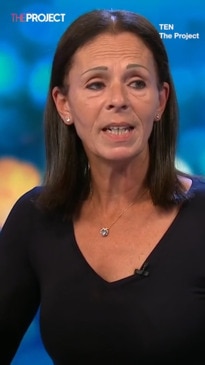Two Aussie mums have made separate, heartbreaking TV appearances outlining how their daughters were failed by the justice system as they demand urgent reforms.
Amid growing outcry at the scourge of male violence — which has already allegedly claimed the lives of at least 26 women this year — Aggie Di Mauro, mother of Celeste Manno, and Tabitha Acret, mother of Mackenzie Anderson, fronted TV screens on Monday night to plead for changes to police reporting and court processes.

“[We were failed] from the very start,” Ms Di Mauro told Channel 10’s The Project.
“I was met with all sorts of condolences, and of course they’ll ‘do better next time’. I don’t get Celeste next time.”
Ms Manno, 23, was stabbed to death as she slept early on November 16, 2020 by her unhinged stalker, Luay Nader Sako, 39, who broke into her family’s Melbourne home after inundating her with “obsessive” messages.
Sako, who had been served an interim intervention order preventing contact with his former co-worker before the murder, was last month sentenced to 36 years in prison.
Do you have a story? Email tips@news.com.au
Ms Di Mauro has been scathing of Victoria’s justice system, saying her daughter was repeatedly let down.
“Our daughters get murdered, we are forced to trust in the process, first by approaching the police,” she said on The Project.
“Right now, I’ve had young women ask me, ‘Do I go to the police?’ I don’t want them to ask me, I tell them to turn to mum and dad, please. The first time [we went to police] we were turned away. He hadn’t committed a crime. Well now he has. I hope they’re happy.”
Asked what change she wanted to see, Ms Di Mauro said police needed to “monitor these beasts”.
“It’s so simple,” she said.
“We all pay tax dollars. They decide where they want to allocate them. They refuse to monitor these beasts. You want women to approach a police station, let you know they’re in fear. This is what we’re telling victims, right? You need to leave the situation. They approach, they tell you they’re in fear, but then you do what? What they need to do, put the damn ankle bracelet on them.”
Ms Di Mauro slammed “legal experts” who argued against the idea on the grounds of “civil liberties”.
“The excuse, and I was given reasons, not to mention those legal experts that gave their reasons as to why they’re against it … [is that] a breach of an intervention order does not mean that person is an offender at that point,” she said.
“So it would invade his or her civil liberties and freedom of movement. I couldn’t care less about their freedom of movement. His freedom of movement put Celeste six feet under.”
She added that “not only do we lose our daughters, but then we need to prepare ourselves for the further injustice like in our case”.
“Our judge did not feel after all the premeditation — three months of it, after downloading the floor plan to pinpoint her room, finding our address on Google Maps — when you hear a judge say in closing, ‘I’m not convinced beyond a reasonable doubt that when you purchased the knife the day after the arrest for the breach you intended to kill Celeste,’ then I knew it was all over,” she said.
“That’ll be my next fight.”
Appearing on the ABC’s Q+A, meanwhile, Ms Acret questioned when there would be an inquest into the judicial system’s handling of domestic violence offenders.
On March 25, 2022, Ms Anderson, 21, was allegedly stabbed to death in Newcastle by her ex-partner.
Tyrone Thompson, 22, was charged with the young mum’s murder and breaching an AVO. He remains before the courts and has pleaded not guilty.
“My daughter suffered two years of domestic violence before her life was tragically taken,” Ms Acret told the panel.
“Her [alleged] murder happened in slow motion, through many failures of the judicial and social system, and we’re still yet to reach trial. My question is … when is there going to be an inquest into the actions of judges in the judicial system for domestic violence offenders?”
Ms Acret then confronted Q+A panel member Mark Speakman, the NSW opposition leader, saying she met with him in 2022 while he was Attorney-General and that he was “condescending and dismissive of me in the meeting”.
“When I did raise that there were major failures in the judicial system … one of his answers, without giving details, was, ‘Well how violent was it?’” she said.
Appearing taken aback, Mr Speakman said he did remember the meeting in his office. “If I was condescending, I apologise,” he said.
“I’m not trauma-informed. I do my best but obviously, in many cases, that’s not good enough.”
Ms Acret replied, “I mean, you know, obviously you’ve led a very privileged male life and you did the best you could in that situation but I think you need to get much more informed.”
The mum said the last two weeks — which saw more horrific alleged murders of women including Molly Ticehurst, 28, in Forbes in NSW’s central west — had been “incredibly triggering for me”.
“Because I know exactly how those families feel, I know their life just became ruined in a way they never could have imagined. And unfortunately I know I might turn on the television tomorrow, and the same thing, and the same thing, and the same thing.”
Ms Acret stressed the importance of “compassion and prevention and how we can intervene”.
“[The media] want the trauma porn from me, they want to see me crying … but they don’t want to have the real discussions,” she said.
“And that’s really annoying because you’re there going, ‘I actually think there’s space to have compassion and there’s space to have better conversations.’ Because just saying they did everything wrong and they have to take responsibility won’t fix the problem. We need some kind of counselling in there, we need rehabilitation.”
She added “I don’t want to throw men out with the bathwater”.
“We have failed them at some point and that’s how they’ve got there,” she said.
“We have to have compassion at the same time. I’m not going to become angry and bitter to all men, but what we do need to do is that we can’t slap them on the wrist and say [to women], ‘Now your life’s at risk because I’m not going to actually follow through with some actions on this.’ And that’s what upsets me greatly with that. This is such a multi-layered issue and we need a lot of different approaches all at once. But the judicial system plays a huge role in it and it has to be better.”
